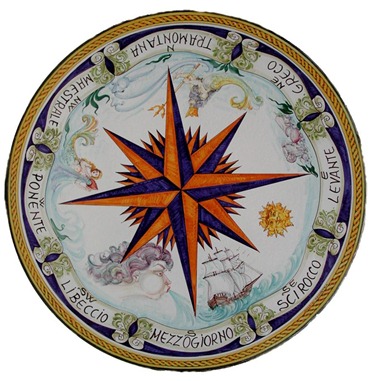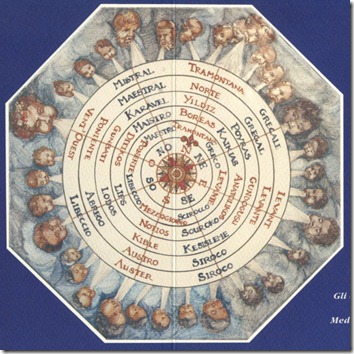La Rosa dei Venti Posted by Serena on Oct 3, 2012 in Culture
If you read or listen to the weather forecast here in Italy you’re quite likely to come across expressions such as: vento di libeccio (wind from libeccio) meaning vento provenienete da sud ovest (wind coming from South West) or vento di tramontana (wind from tramontane) meaning vento proveniente dal nord (wind coming from the North). The reason for this is that we still use the traditional names taken from the Medieval rosa dei venti (wind rose), on which each of the four cardinal points and their four subdivisions is named after a wind.
Historically, the use of la rosa dei venti (wind rose) precedes the compass, and has been a common tool for sea travelling since the times of la Repubblica Amalfitana (Amalfi’s Republic) before the Twelfth century. Traditionally, in the middle ages, seafarers maps had la rosa dei venti positioned in the Mare Ionio (Ionian Sea) somewhere near the island of Zante (Zakynthos), and it’s from that point of view that the winds take their names.
Tramontana (Tramontane) is the wind that blows from the North. The name comes the Latin ‘trans-montes’ meaning ‘beyond the mountains’. It most probably refers to the mountains in Albania, immediately north of Zante. It’s a very cold wind which brings dry weather and very clear visibility.
Grecale or Greco (Lit. Greek) is the wind that blows from the North-East. It takes its name from mainland Greece, which is immediately north-west of Zante. Typical of the winter season, it normally blows from the Balkans and/or Siberia.
Levante (Lit. Where the sun rises) is the wind that blows from the East. The East in Italian is traditionally called Levante because it’s where il sole si leva (the sun rises). It’s a wind typical of the summer season.
Scirocco (Sirocco) is the wind that blows from the South-East. It takes its name from Syria, as the ships sailing from that country would arrive in the Ionian sea from the south-east. It’s a very hot wind blowing from the eastern Sahara, bringing very high temperatures, especially in the summer. It can be very humid due to the condensation formed while crossing the Mediterranean sea.
Mezzogiorno (Lit. Midday), or Ostro is the wind that blows from the South. The word ‘ostro’ comes from the Latin word ‘auster’, meaning ‘south’, and is the root of the name Australia. The Ostro is a very weak wind.
Libeccio (Lit. Libyan) is the wind that blows from South-West. In ancient times the name Libya used to indicate all the North African countries west of Egypt, therefore it included Tunisia and Algeria, which are south-west of Zakynthos. The Libeccio is a damp wind with violent raffiche (gusts).
Ponente (Lit. Where the sun sets) is the wind that blows from the West. The West in Italian is traditionally called Ponente because it’s where il sole si pone (the sun sets). It’s a summer wind which blows mostly in the afternoon.
Maestrale (Mistral) is the wind that blows from the North West. The name maestrale, or maestro, refers to la via maestra (the master route), the main route for the ships sailing from Venezia to Zante, which was a Venetian colony for centuries. Maestrale is a strong, cold wind.

Build vocabulary, practice pronunciation, and more with Transparent Language Online. Available anytime, anywhere, on any device.






Comments:
William Auge:
Grande lezione di storia!
Grazie, Bill
Mike Mazzaschi:
Well done, now I can blame the Syrians for the dust on my windshield. Before you set sail, double check Grecale, I think you mean North-East.
Geoff:
@Mike Mazzaschi Salve Mike!
Thanks for the compliments and for spotting the error. Per fortuna non sono una cartografa, o farei naufragare molte barche!
Saluti da Serena
jeremy thorpe:
Triffick!!!
nice one, well done you.
If you happen to know the names that Italian farmers used for these winds please email me at jeremyartist at yahoo.com, thanks. jeremy.